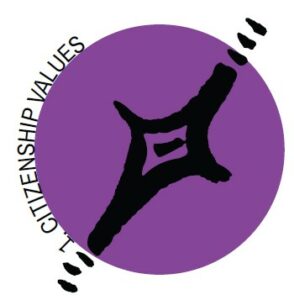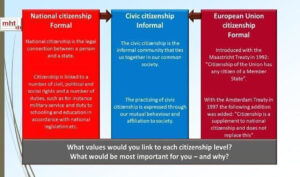
| Keywords: | Citizenship; Integration; Societal and Democratic Values |
| Objectives: | Understanding different concepts of citizenship, including formal and civic citizenship as well as lack of citizenship. Reflecting on the implications and consequences of the different forms of citizenship and how they affect our daily lives. |
| Target group: | Plenary or smaller groups of migrants or mixed groups of migrants and local people. Suitable for young people and adults. |
| Duration: | 30 – 60 minutes depending on the number of participants. |
| Methodology step-by-step: | 1) Present different aspects of the concept of citizenship using the figure below. Differentiate between Formal, Civic and EU Citizenship. 2) Reflect upon and discuss the various types of citizenship and the differences between them, including which values each citizenship type represents for each person and how civic citizenship may be practised in everyday life. 3) Present the conclusions of the discussion either orally or by using the paper or flipchart. Note: It is important to spend some time on the introduction, as the differentiation between formal and civic citizenship may be new for some participants. |
| Resources needed: | – A powerpoint presentation showing the figure below. It is also possible to add further illustrative examples of formal and informal citizenship. – Large pieces of paper or a flipchart – Post-its or small pieces of paper |
| Challenges: | It is important to be aware that the concept of formal and civic citizenship may give rise to some controversial discussions, as some participants may have applied for the national (and thereby the European) citizenship of the country in which they now live without having yet obtained it. It may give rise to personal frustration and even highlight discrimination present in the group. |
